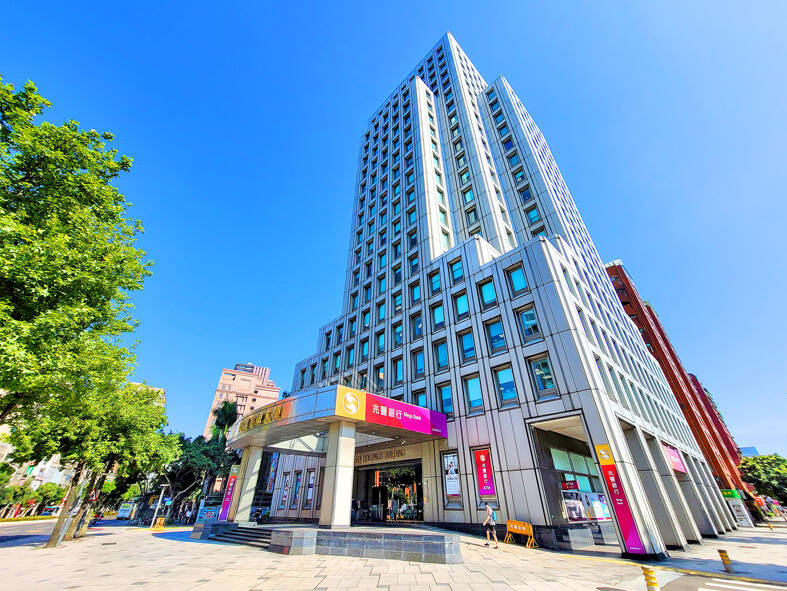State-run Mega Financial Holding Co (兆豐金控) yesterday said that it expects loan growth this year, helped by an export-driven economic recovery, and is eyeing solid gains in wealth management amid a pickup in investment sentiment
“We would seek to remain the best performer in terms of earnings ability this year among state-run peers,” Mega Financial chairman Lei Chung-dar (雷仲達) told an online investors’ conference.
The group would consolidate its leadership position in syndicated loans, corporate banking and foreign currency operations, Lei said.

Photo courtesy of Mega Financial Holding Co
Net income last year surged 81 percent to NT$33.25 billion (US$1.05 billion), or earnings per share of NT$2.37, outperforming other state-run financial institutions, he said.
That is because interest rate hikes at home and abroad shored up interest incomes, while restrictive monetary policies increased funding costs and inhibited loan demand, Mega Financial said.
Hopefully, the situation would ease in the second half of this year after the US Federal Reserve starts to cut interest rates, making corporations more willing to take out loans, it added.
However, the interest rate gap between Taiwan and the US would mitigate, becoming less favorable for foreign exchange swap operations, which generated more than NT$10 billion in trading gains last year, it said.
The company’s banking arm, Mega International Commercial Bank (兆豐銀行), expects local tech firms to display more borrowing interest this year on the back of a positive technology product cycle and a recent artificial intelligence frenzy, Mega International Commercial Bank president David Hu (胡光華) said.
At the same time, Mega Financial is seeking to increase sales of mutual funds and insurance policies by 30 percent this year, as Taiwanese demonstrate better risk appetite, Mega Financial said, citing avid interest among retail investors for exchange-traded funds.
Mega Bank is collaborating with department stores, airlines, travel agencies and online hotel booking operators to win customers and boost credit card spending, it said.
However, the group’s non-life insurance wing, Chung Kuo Insurance Co (兆豐產險), remained a profit drag due to lingering COVID-19 insurance claims, it said.
Chung Kuo Insurance is contemplating capital increase plans to improve its financial health after setting aside NT$2.8 billion last year, it added.
Mega Financial declined to comment on its dividend policy except that the board of directors will discuss the matter next month.

When an apartment comes up for rent in Germany’s big cities, hundreds of prospective tenants often queue down the street to view it, but the acute shortage of affordable housing is getting scant attention ahead of today’s snap general election. “Housing is one of the main problems for people, but nobody talks about it, nobody takes it seriously,” said Andreas Ibel, president of Build Europe, an association representing housing developers. Migration and the sluggish economy top the list of voters’ concerns, but analysts say housing policy fails to break through as returns on investment take time to register, making the

‘SILVER LINING’: Although the news caused TSMC to fall on the local market, an analyst said that as tariffs are not set to go into effect until April, there is still time for negotiations US President Donald Trump on Tuesday said that he would likely impose tariffs on semiconductor, automobile and pharmaceutical imports of about 25 percent, with an announcement coming as soon as April 2 in a move that would represent a dramatic widening of the US leader’s trade war. “I probably will tell you that on April 2, but it’ll be in the neighborhood of 25 percent,” Trump told reporters at his Mar-a-Lago club when asked about his plan for auto tariffs. Asked about similar levies on pharmaceutical drugs and semiconductors, the president said that “it’ll be 25 percent and higher, and it’ll

NOT TO WORRY: Some people are concerned funds might continue moving out of the country, but the central bank said financial account outflows are not unusual in Taiwan Taiwan’s outbound investments hit a new high last year due to investments made by contract chipmaker Taiwan Semiconductor Manufacturing Co (TSMC, 台積電) and other major manufacturers to boost global expansion, the central bank said on Thursday. The net increase in outbound investments last year reached a record US$21.05 billion, while the net increase in outbound investments by Taiwanese residents reached a record US$31.98 billion, central bank data showed. Chen Fei-wen (陳斐紋), deputy director of the central bank’s Department of Economic Research, said the increase was largely due to TSMC’s efforts to expand production in the US and Japan. Investments by Vanguard International

WARNING SHOT: The US president has threatened to impose 25 percent tariffs on all imported vehicles, and similar or higher duties on pharmaceuticals and semiconductors US President Donald Trump on Wednesday suggested that a trade deal with China was “possible” — a key target in the US leader’s tariffs policy. The US in 2020 had already agreed to “a great trade deal with China” and a new deal was “possible,” Trump said. Trump said he expected Chinese President Xi Jinping (習近平) to visit the US, without giving a timeline for his trip. Trump also said that he was talking to China about TikTok, as the US seeks to broker a sale of the popular app owned by Chinese firm ByteDance Ltd (字節跳動). Trump last week said that he had